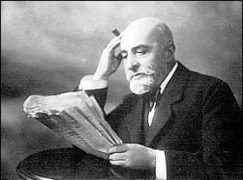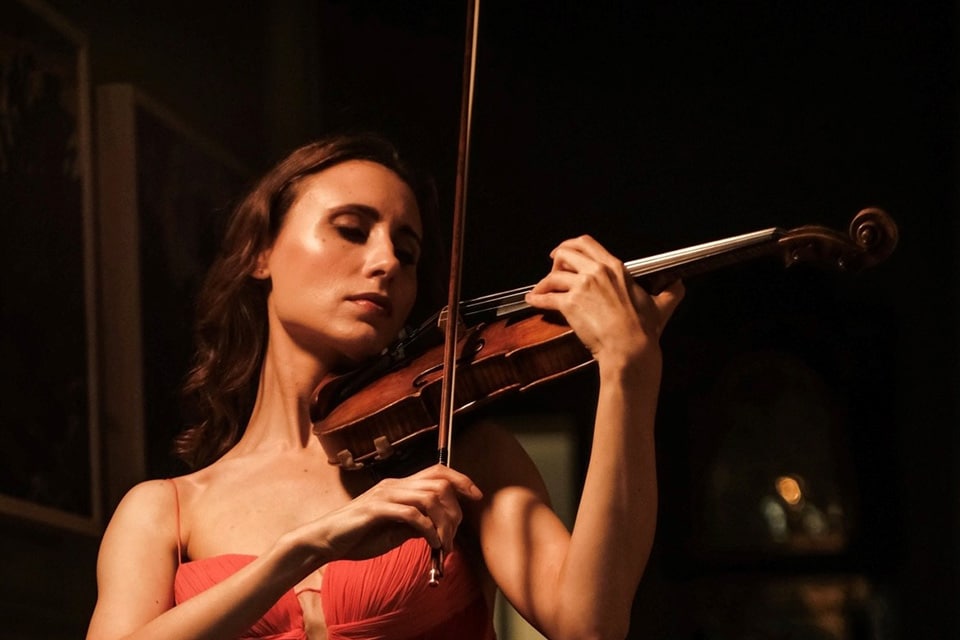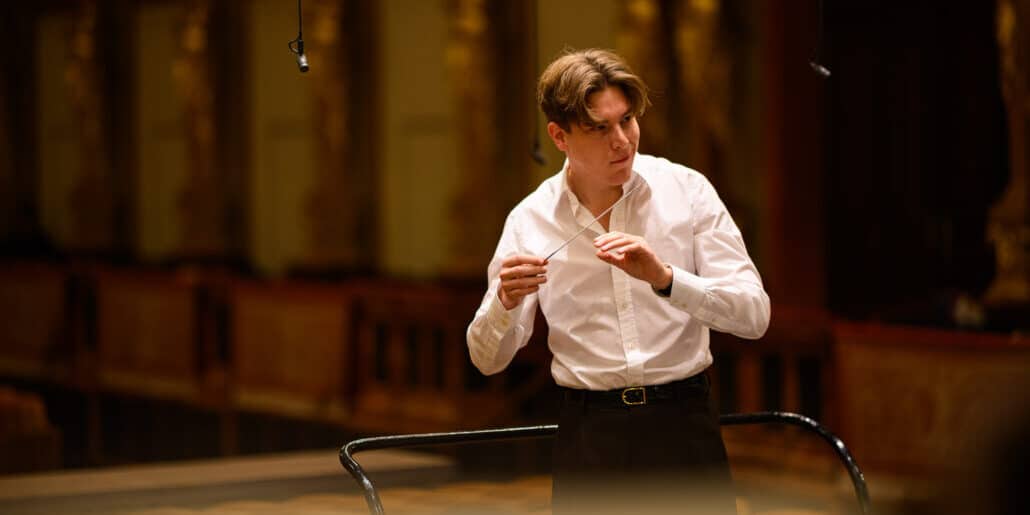Did Leopold Auer learn technique from his pupils?
mainThe Hungarian-born violinist who taught in St Petersburg from 1868 to 1917 is generally acclaimed as the ‘father’ of the Russian school of violin playing.
But was he?
In a challenging new essay, the young violinist Yevgeny Chepovetsky, himself a student of an Auer-linear teacher, asks as uncomfortable question. Why is it that from 1868 to 1903 Auer did not produce a single star pupil?
From 1868 to 1903, Auer was completely unknown as a teacher beyond Russia’s border.
So what changed in 1903?
He met an 11-year-old child named Mischa Elman. It happened at one of those godforsaken outskirts of Russian Empire within a Jewish Pale of Settlement where Elmans lived for generations. Auer accepted the child into his class in St. Petersburg.
Sixteen months later Mischa made his sensational debut in Berlin, the most important musical city of that time. Elman started concertizing internationally right after, never returning to Auer’s class…
Read on here.






Of course teachers learn technique from their pupils. It’s a two way street. How could this be a surprise to any musician?
Indeed, and many of the finest teachers have said so. But by 1903, Auer no longer taught technique in his very advanced class. Elman already had it, and Auer expected others to do so. What he focused on was interpretation and musicality. Students should and did sort out their own technical issues. I detect in the article some denigration of Auer, certainly in the lack of detail re Auer’s considerable successes as a soloist, a matter of skewing the picture by omission. I’m a great admirer of Elman, whose tone and general manner of playing is still evident in his recording of the Tchaikovsky concerto with Sir Adrian Boult, circa 1956, not just in early recordings. But I think the author is rather stretching in the effort of make his argument that Elman was the real founder of the Russian school.
It is difficult to accept such arguments. «Auer no longer taught technique in his very advanced class» may refer to the personality, rather than technique. Auer has a lot of technical indications in his books, and his famous deep “Russian bowhold” goes exactly from Mischa Elman.
If Auer really hadn’t taught technique in his advanced class, what Zimbalist speaks about in this his comment “I remember how definitely Mischa changed Auer’s conception of tone and technique”?
By the way, Elman’s unique golden tone had already faded after WWII. It flourished exactly in his early years.
No, it hadn’t. Elman actually got better as he got older.
It must be painful for some to see that others made it big. They then look for excuses and create arguments that talent doesn’t exist. They should just get on with practising if they really want to get somewhere.
Agreed that the teacher-student relationship should be a two street concerning shared knowledge. Of course Auer was the source of what we currently call the “Russian School” of violin playing but it’s to his credit that his teaching technique evolved based on the needs and gifts of his students like Elman, Heifetz, Zimbalist and others. In some violin studios, the fingerings and other markings go from the score of the teacher to the score of the student without passing through the mind of either (paraphrase of an old saw concerning university professors). Co-opting ideas from one’s students is an admirable quality if the teacher passes that knowledge on to future generations.
Auer taught for a brief period at both Curtis and Juilliard; his teaching assitant in New York was his former student Vladimir Graffman (father of Gary Graffman). Imagine the violin faculty at Curtis in the late 1920s with Leopold Auer and Carl Flesch in competing studios.
wow!
Let me throw some cold water on my euphoria: After a bit of research (30 seconds), it seems likely that Flesch and Auer were not at Curtis simultaneously. Flesch from 1924-28 and Auer from 1928 until his death in 1930.
And Auer pupil Zimbalist taking over the fiddle dept. as well as eventually becoming Curtis president.
Dounis was represented @ Curtis by Primrose, Tuttle and later, Silverstein. I thought it unfortunate that Dounis’ pedagogy wasn’t available @ Juilliard.
Silverstein had a few lessons with Dounis one summer and when Zimbalist found out, he ask him to leave the school around 1950. I believe that Joey received his Curtis diploma (honoris causa) from Gary Graffman many, many years later.
I talked to Joe about this in Philly @ the Warwick Hotel where we were both staying. Rosand (with whom I worked in the NY studios) went out to Zimmie’s home in NV and regaled him with Joe’s professional accomplishments since being kicked out of Curtis, including occupying a violin faculty chair @ the school. Zimmie relented, allowing Joe to graduate in ’50, his original graduation year. BTW, as a violinist whose modest professional career was saved by Dounis training, I can state that Joe’s technique exhibited much of the hallmarks of Dounis’ pedagogy.
Pianists can ask the same question about Rosina Lhevinne, who taught at Juilliard from 1922, but produced no star pupils before 1953, when John Browning and Van Cliburn entered her class – and after that she was a star-maker.
Indeed. However, her husband, Josef Lhévinne, continued teaching at the same school until his death in 1944. Since Rosina gave up her solo career to the benefit of her husband (although they still performed together as a duo), I’m pretty sure that Josef also got most of the more talented students up until then.
According to the Wikipedia site, he actually enjoyed teaching more than performing!
$1400 (in today’s dollars) for an hour lesson!
What are lessons with prominent conservatory teachers going for these days?
I don’t know about today but when Carl Flesch was in London in the late 1930′ he was charging 2.5 guineas for 45 minutes. In today’s money that is £165.
PS. I believe that Zakar Bron is getting over $1000 for a private lesson.
Teachers. Do we really need them when there’s all this material on the internet?
Yes.
Do you diagnose your own medical problems accurately by looking up your symptoms on the internet? Can you give yourself therapy by reading articles in Psychology Today?
The internet has a wealth of information. It cannot see and analyze the artistic, biomechanic, musical, and human aspects of a person and guide them to grow with exactly the conditions, support, and challenges that unique individual requires at that moment.
It depends on the city in the USA. In NYC, many teachers (especially of voice) command at least $200/hour with some studios considerably higher (perhaps approaching and exceeding $500/hour) Those who teach in a conservatory actually make a bit less per hour but their reputation inflates the rate they can command from external private students. Some are actually worth it. An hour with an inspirational master teacher is always priceless.
Contrary to what most folks assume, teachers at Curtis and Juilliard on hourly contracts usually make less at the school than their external rate. Full-time contract salaried teachers are expected to teach18 hour per week (but most do a lot more voluntarily).
Josef Hofmann’s hourly rate for teaching piano at Curtis was $100/hour in the 1920s. Hofmann hired Auer and offered him a bit more than he made for teaching.
I know of one important NYC teacher whose rate decreases for the most talented (to the point of not charging at all).
$100/hour in 1920 is $1300 for today
Cost of living I suppose
Not “producing” a “star” student for up to three decades of teaching and then “suddenly” being able to boast of a “constellation” in a short period of a few years should not be all that unusual and/or surprising for several reasons: 1 – it takes time and experience to hone one’s teaching skills; 2 – it is practically impossible for a teaching novice to acquire most talented students until solid reputation is established; 3 – once the first “star” student becomes known, the teacher then has the ability to choose the best students, thus greatly increasing probability for several more “stars” to emerge from the class. Cases like that of Zakhar Bron are rare exceptions: he got uncommonly lucky to have Repin and Vengerov after just a few years of professional teaching and had an easy time of attracting outstanding students for several decades after that, yet, to the best of my recollection at the moment, has been unable to “produce” any violinists of a quality that would be comparable to those two brilliant Siberians.
Yevgeny Chepovetsky statement’s simply cheap sensation. Pharisee, that never read the story of Cherniavsky musician. Even Misha Elman was born in “Steitl” near Kiev, at age five his family moved to Odessa to provide to talented Misha better musical training. Abraham Cherniavsky was his first teacher. Misha played at his youth orchestra. Gregor Cherniavsky, son of AC was favored and promising student way before Misha .Nine children of AC became professional musicians. The famous Cherniavsky trio.
Do you mean it was Abraham Cherniavsky who taught Mischa Elman his golden tone, his bowhold and his vocal style of playing?
According to Allan Kozin, the author of Elman’s most complete bio, Mischa started to play violin at the age of 5 secretly from his parents. At the age of 6, he was taken to Odessa, first to some small private school for talented poor children and then to Imperial Academy of Music. In both places, his teacher was Alexander Fiedelman, the student of Adolf Brodsky. Then they met Auer. There was no Abraham Cherniavsky who “moved to Odessa to provide to talented Misha better musical training” as you insist.
Allan Kozin mentions some conservatory-trained conductor who led a little ad hoc orchestra at Shpola (neighbouring town) that played in the parks and at weddings. Once Mischa’s father Saul took Mischa to show his son to this person. He could be Abraham Cherniavsky. Mischa really played two times with his orchestra, for the first time, tiny waltz Daisy of his own composition, and for the second time something else remained unknown.
It is known that he taught Mischa the rudiments of notation and that Elman later thought of him quite adversely.
Could you please provide more details on Abraham Cherniavsky relevant to this story?
Who taught Mischa’s Golden Tone?
Easy. He was born with it.
One is not supposed to say things like that, these days. How refreshing that you have.
Misha started with AC to learn violin in Shpola but was difficult for Abram to teach 5 year old boy. Misha’s family moved to Odessa. Talented boy got support from count Urusova and good teachers. I read book “The Cherniavsky trio” by Felix Cherniavsky. Amazing story of talented and famous at their time family.
Thank you, I’ll look for this book. Countess Urusova really loved Mischa. She wanted to buy him from his father and to convert to Christianity. After some of her antisemitic acts, Saul refused to accept her patronage, and that was the reason why Saul took Mischa from Shpola to Odessa.
In the end, the facts are, one year with Cherniavsky (occasionally), 5 years with Fiedelman (systematically) and the influence of the family of fiddlers since birth. Neither Mischa’s father Saul, nor Allan Kozinn mention Cherniavsky’s name in their books. That’s saying something about the importance of this person, isn’t it?
So, it doesn’t look that “Yevgeny Chepovetsky statement’s simply cheap sensation”. As far as i can judge, his article doesn’t distort the true picture at all.
Y,Chepovetsky’s young violinist that lived and studied in Riga, the best music school in USSR. YC didn’t have the wealth of book in English about musicians that good source of information. L.Auer wrote books that was published in Russian. Not mention the biggest star student-Miron Polyakin, his favored as Jasha Heifetz. L.Auer studied with J.Joachim and Josef Helmesberger, G.Enescu teacher. I suggest to Gennady to read Ron Malan book “Zimbalist” YC’s only 22 and should research and read more on LA before to make contradictory statement. And ,remember Ivan Galamian-also LA student and his contribution to training stars.
Y,Chepovetsky’s young violinist that lived and studied in Riga, the best music school in USSR. YC didn’t have the wealth of book in English about musicians that good source of information. L.Auer wrote books that was published in Russian. Not mention the biggest star student-Miron Polyakin, his favored as Jasha Heifetz. L.Auer studied with J.Joachim and Josef Helmesberger, G.Enescu teacher. I suggest to Gennady to read Ron Malan book “Zimbalist” YC’s only 22 and should research and read more on LA before to make contradictory statement. And ,remember Ivan Galamian-also LA student and his contribution to training stars.
Contradictory statement? All the great Auer’s pupils you mentioned graduated from his class AFTER Mischa’s tremendous success in Europe. That’s exactly what YC states in his article. What’s wrong? Where do you see the contradiction?
Ivan Galamian did not study with Auer
Sure. Milstein was probably the last famous Auer’s student in Russia.
Does anyone out there know about Auer’s Spanish student,Carlos Sedano?
He studied with LA in NY during the 1920s and made a few recordings.
Some are on the youtube.
Sedano was fantastic. However,very little is known about him
Never heard of him, really great. There’s very little information about him on the net. https://ca.wikipedia.org/wiki/Jos%C3%A9_Carlos_Rodr%C3%ADguez_Sedano
Carlos Sedano died in 1978 aged 75.
What became of him after the 1920s?
Also,it is conjectured that,like Paganini,he had Marfan Syndrome.
However,given that he made it to 75,he couldn’t have had it badly.
He is mentioned here as a Conservatory Professor in Madrid in 1944 http://www.heraldo.es/blogs/tinta/?p=1949
Gennady,brilliant! We are on the same wavelength! Sedano also taught the late Victor Martin. The violinist who often said that anybody who thinks that Bach should be played without vibrato is mad.
)) Yes, Stern used to say the same thing, albeit in somewhat weaker form.
Ivan Galamian studied with Konstantin Mostras, LA student and there’s a lineage. AL had performing career before going into teaching.
Gregor Cherniavsky was his big hope, but GC was a mental case and commtted suicide.
Ivan Galamian studied with Konstantin Mostras, LA student and there’s a lineage. LA had performing career before going into teaching.
Gregor Cherniavsky was his big hope, but GC was a mental case and commtted suicide.